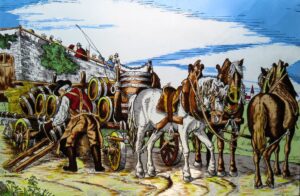If we explore the origins of craft beer, we uncover a rich tapestry of anthropology and history in the regions where beer was first brewed. This journey takes us back to the very cradle of civilization. The Middle East has been a cultural and historical hub for thousands of years, influencing everything from craft beer to modern-day borders. The history of beer goes back millennia.
The Birthplace of Beer: Mesopotamia
It is impossible to pinpoint the exact moment when the first human consumed craft beer, but anthropologists and archaeologists agree: Mesopotamia, in what is now the Middle East, was the birthplace of beer around 5000 to 4000 BCE. In modern-day Iran, the site of Godin Tepe Sumeria is renowned for the earliest chemically confirmed barley beverage, discovered by researchers in the 5th millennium BCE.

Beer and the Gods
By 4000 BCE, brewing had become significant in Middle Eastern cultures. The Sumerian god Ninkasi and the Egyptian goddess Tenenit were worshipped as deities of beer. Ancient hieroglyphics even depict people enjoying beer together, highlighting its importance in social and religious contexts, showcasing beer’s rich history.
Sumerians and Babylonians: Early Brewmasters
The Sumerians were instrumental in developing brewing techniques and supplying beer to early civilizations like the Babylonians, who built the first major cities. By 3000 BCE, beer symbolized wealth and divine favor in Babylon, with over 20 different types crafted. This historical aspect of beer is evident as the Babylonian code of laws even prescribed daily beer rations, and citizens drank their thick, porridge-like barley beer through straws.

Women: The Original Brewmasters
Women were the original brewmasters in Mesopotamia, brewing beer at home for meals, guests, and celebrations. Known as the priestesses of Ninkasi, these women were integral to the brewing process. Under Babylonian rule, the Code of Hammurabi even referred to “tavern-keepers” in the feminine. A key part of the history of beer involves these women brewmasters.
Egyptian Contributions to Brewing
By 1500 BCE, the Egyptians had further refined beer’s taste and brewing process. Beer played a central role in their society, used in rituals and as compensation for laborers working on the Giza plateau, who received three beers daily. Ancient Egyptian tombs have been found with beer, intended to accompany Pharaohs into the afterlife. This practice highlights the significance of beer’s history in ancient societies.
The Evolution of Beer with Agriculture
As hunter-gatherers transitioned to farming, humanity began experimenting with grains and water, leading to the discovery of alcohol. This shift allowed humans to settle, build permanent homes, and enjoy life beyond survival. Craft beer emerged as a symbol of newfound stability and enjoyment in this context. The evolution of beer closely follows the development of agriculture throughout history.
The history of beer in the Middle East is a testament to humanity’s ingenuity and cultural evolution. From its earliest days in Mesopotamia to the sophisticated brews of ancient Egypt, beer has been vital to social and religious life. Today, the legacy of these early brewers continues to influence the craft beer we enjoy.

